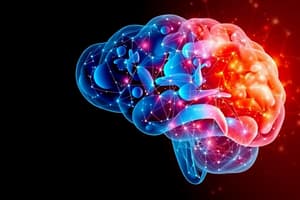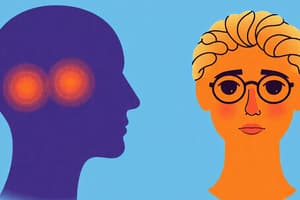Podcast
Questions and Answers
Which perspective in psychology emphasizes the individual's potential for growth and self-actualization?
Which perspective in psychology emphasizes the individual's potential for growth and self-actualization?
- Psychodynamic
- Behavioral
- Cognitive
- Humanistic (correct)
A child demonstrates object permanence when they:
A child demonstrates object permanence when they:
- Can solve complex mathematical problems.
- Develop strong attachments to caregivers.
- Understand that objects continue to exist even when they are out of sight. (correct)
- Begin to use language to communicate.
According to Freud, which component of personality operates on the pleasure principle?
According to Freud, which component of personality operates on the pleasure principle?
- Id (correct)
- Ego
- Conscious
- Superego
Which of the following is an example of negative reinforcement?
Which of the following is an example of negative reinforcement?
What is the primary focus of cognitive psychology?
What is the primary focus of cognitive psychology?
What does Erik Erikson's theory of psychosocial development emphasize?
What does Erik Erikson's theory of psychosocial development emphasize?
Which defense mechanism involves attributing one's own unacceptable thoughts or feelings to another person?
Which defense mechanism involves attributing one's own unacceptable thoughts or feelings to another person?
According to Maslow's hierarchy of needs, which needs must be met first before an individual can pursue self-esteem?
According to Maslow's hierarchy of needs, which needs must be met first before an individual can pursue self-esteem?
What is the main idea behind Bandura's social learning theory?
What is the main idea behind Bandura's social learning theory?
Which of the following is a key characteristic of the formal operational stage of cognitive development?
Which of the following is a key characteristic of the formal operational stage of cognitive development?
What is the focus of the biological perspective in psychology?
What is the focus of the biological perspective in psychology?
What is the concept of 'self-efficacy' as defined by Bandura?
What is the concept of 'self-efficacy' as defined by Bandura?
According to Carl Rogers, what is unconditional positive regard?
According to Carl Rogers, what is unconditional positive regard?
Which of the following is an example of classical conditioning?
Which of the following is an example of classical conditioning?
What is the role of the superego in Freud's theory of personality?
What is the role of the superego in Freud's theory of personality?
Which of the following is a characteristic of the authoritarian parenting style?
Which of the following is a characteristic of the authoritarian parenting style?
According to drive-reduction theory, what motivates behavior?
According to drive-reduction theory, what motivates behavior?
What is the concept of 'confirmation bias' in cognitive psychology?
What is the concept of 'confirmation bias' in cognitive psychology?
Which attachment style is characterized by a fear of intimacy and difficulty trusting others?
Which attachment style is characterized by a fear of intimacy and difficulty trusting others?
What is the main difference between intrinsic and extrinsic motivation?
What is the main difference between intrinsic and extrinsic motivation?
What is the focus of the sociocultural perspective in psychology?
What is the focus of the sociocultural perspective in psychology?
According to Piaget, what is accommodation?
According to Piaget, what is accommodation?
Which of the following is an example of a projective personality test?
Which of the following is an example of a projective personality test?
What is the difference between reinforcement and punishment?
What is the difference between reinforcement and punishment?
What is the concept of 'learned helplessness'?
What is the concept of 'learned helplessness'?
Which of the following is a key element of the humanistic approach to personality?
Which of the following is a key element of the humanistic approach to personality?
What does the concept of 'scaffolding' refer to in Vygotsky's theory of cognitive development?
What does the concept of 'scaffolding' refer to in Vygotsky's theory of cognitive development?
Which of the following is an example of a fixed-ratio reinforcement schedule?
Which of the following is an example of a fixed-ratio reinforcement schedule?
In the context of personality theories, what is a 'trait'?
In the context of personality theories, what is a 'trait'?
What is the 'zone of proximal development' (ZPD) in Vygotsky's theory?
What is the 'zone of proximal development' (ZPD) in Vygotsky's theory?
Which of the following best describes the concept of 'reciprocal determinism' in Bandura's social cognitive theory?
Which of the following best describes the concept of 'reciprocal determinism' in Bandura's social cognitive theory?
What is the primary goal of psychoanalysis?
What is the primary goal of psychoanalysis?
Which of the following is an example of a variable-interval reinforcement schedule?
Which of the following is an example of a variable-interval reinforcement schedule?
In the context of attachment theory, what does 'internal working model' refer to?
In the context of attachment theory, what does 'internal working model' refer to?
According to self-determination theory, what are the three basic psychological needs that promote intrinsic motivation?
According to self-determination theory, what are the three basic psychological needs that promote intrinsic motivation?
What is the 'halo effect' in social perception?
What is the 'halo effect' in social perception?
According to Freud, which psychosexual stage is characterized by a focus on genital stimulation and the development of mature sexual interests?
According to Freud, which psychosexual stage is characterized by a focus on genital stimulation and the development of mature sexual interests?
In classical conditioning, what is stimulus generalization?
In classical conditioning, what is stimulus generalization?
Which is not one of The Big Five personality traits?
Which is not one of The Big Five personality traits?
Flashcards
What is psychology?
What is psychology?
The scientific study of the mind and behavior.
Nature vs. Nurture
Nature vs. Nurture
The debate over the relative contributions of genetic inheritance (nature) and environmental factors (nurture) to human development.
Erikson's Theory
Erikson's Theory
A stage-based theory of psychosocial development, emphasizing social interaction and conflicts at each stage.
What is personality?
What is personality?
Signup and view all the flashcards
Freud's Psychoanalytic Theory
Freud's Psychoanalytic Theory
Signup and view all the flashcards
Defense Mechanisms
Defense Mechanisms
Signup and view all the flashcards
Maslow's Hierarchy of Needs
Maslow's Hierarchy of Needs
Signup and view all the flashcards
What is learning?
What is learning?
Signup and view all the flashcards
Classical Conditioning
Classical Conditioning
Signup and view all the flashcards
Operant Conditioning
Operant Conditioning
Signup and view all the flashcards
Observational Learning
Observational Learning
Signup and view all the flashcards
What is motivation?
What is motivation?
Signup and view all the flashcards
Drive-Reduction Theory
Drive-Reduction Theory
Signup and view all the flashcards
Arousal Theory
Arousal Theory
Signup and view all the flashcards
Extrinsic Motivation
Extrinsic Motivation
Signup and view all the flashcards
Intrinsic Motivation
Intrinsic Motivation
Signup and view all the flashcards
Study Notes
- Psychology is the scientific study of the mind and behavior
- It involves the use of scientific methods to understand and explain how people think, feel, and act
- Psychology spans diverse subfields including developmental, social, cognitive, and clinical psychology
Growth and Development
- Growth refers to the quantitative changes in an individual, such as height and weight
- Development encompasses qualitative changes, including cognitive, social, and emotional transformations
- Development is a continuous process from conception to death
- Major stages of development include infancy, childhood, adolescence, and adulthood
Personality
- Personality refers to the unique and consistent patterns of thinking, feeling, and behaving that characterize an individual
- Trait theories suggest that personality is composed of broad dimensions or traits
- Prominent trait theories include the Five-Factor Model (Openness, Conscientiousness, Extraversion, Agreeableness, Neuroticism)
- Psychodynamic theories, such as Freud's, emphasize the role of unconscious processes and early childhood experiences in shaping personality
- Humanistic theories focus on the individual's subjective experience, self-concept, and drive for self-actualization
- Social-cognitive theories highlight the role of observational learning, self-efficacy, and situational factors in personality
Psychology of Learning
- Learning is a relatively permanent change in behavior or knowledge as a result of experience
- Classical conditioning involves learning through association, where a neutral stimulus becomes associated with a conditioned stimulus to elicit a conditioned response
- Operant conditioning involves learning through consequences, where behaviors are strengthened by reinforcement and weakened by punishment
- Observational learning involves learning by watching and imitating others
- Key figures in learning theory include Ivan Pavlov (classical conditioning), B.F. Skinner (operant conditioning), and Albert Bandura (observational learning)
Motivation
- Motivation refers to the processes that initiate, guide, and maintain goal-oriented behaviors
- Intrinsic motivation arises from internal factors, such as enjoyment and satisfaction
- Extrinsic motivation arises from external factors, such as rewards and punishments
- Maslow's hierarchy of needs proposes that individuals are motivated to fulfill basic needs before pursuing higher-level needs
- Key theories of motivation include drive theory, incentive theory, and cognitive theories
- Drive theory suggests that motivation arises from physiological needs that create internal drives to restore homeostasis
- Incentive theory suggests that motivation arises from external stimuli that attract individuals towards certain goals
- Cognitive theories emphasize the role of thoughts, beliefs, and expectations in motivation
Studying That Suits You
Use AI to generate personalized quizzes and flashcards to suit your learning preferences.




